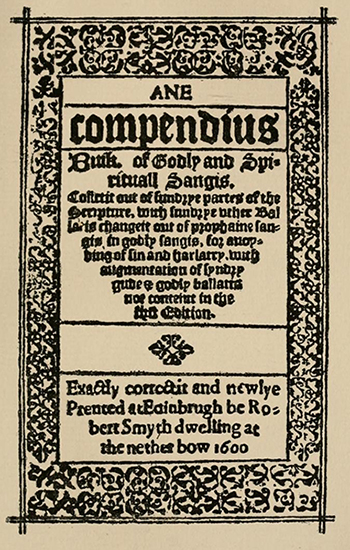15.2 The impact of Anglicisation on religious language in Scotland
It took fifty years, and much longer in the Highlands, before the full impact of this Anglicisation of religious language was felt. Also, although the Presbyterians advocated a ‘pure’ form of Christianity, ‘uncontaminated’ by human customs and traditions, which they labelled ‘idolatrie’, this aim was in effect impossible. Religion continued to be an important social activity in which Scots-speaking families and communities participated. People also continued to argue about religion and to sing religious songs, despite attempts to keep both within strict limits!
In fact, Protestant sympathisers had already harnessed popular Scots culture to the cause, in the shape of Sir David Lindsay’s Ane Satyre of the Thrie Estaitis, which you came across in unit 9. This innovative drama, which developed in the 1540s–50s, begins in the world of the medieval morality play, moves into a practical contemporary agenda for religious and political reform, and then culminates in foolerie and farce.
Scots is the essential medium throughout, and when in 1948 an adaptation of Lindsay’s Satyre headlined the Edinburgh International Festival, a dynamic connection was formed between Scots dramatic traditions and the modern literary renaissance.

In 1567, Protestant Reformers published a collection of sacred songs combining Protestant inclined lyrics with Scottish folk melodies. These Gude and Golie Ballatis were in due course to lead to a Scottish Psalter and the Paraphrases, which were scriptural texts, in English, adapted into regular metre for singing. But initially the mix was much broader and some texts survive which are clearly carols.
There may even be an inheritance here from the medieval Mystery Plays, which were performed in Scottish towns in the 15th and 16th centuries. Again, the Scots character of the lyrics reflects their social context and the continuing role of Scots as a medium for spoken word and song as exemplified in this extract from The Conceptioun of Christ as printed in the Gude and Golie Ballatis (pp. 83–4):
Let us rejoyce and sing,
And praise that michtie King,
Qhuilk send his Sone of a Virgin bricht.
La. Lay. La.
And on him tuke our vyle nature,
Our deidlie woundis to cure,
Mankynde to hald in richt.
La.lay.La …….
Thou blyssit Virgin mylde,
Thou sall consave an Chylde
The pepill redeem sall he:
La.Lay.La.
Here is a recorded version of this extract and you might want to read along while listening to practise your spoken Scots.
Transcript
Let us rejoyce and sing, And praise that michtie King, Qhuilk send his Sone of a Virgin bricht. La. Lay. La. And on him tuke our vyle nature, Our deidlie woundis to cure, Mankynde to hald in richt. La.lay.La ……. Thou blyssit Virgin mylde, Thou sall consave an Chylde The pepill redeem sall he: La.Lay.La. Here is a recorded version of this extract and you might want to read along while listening to practise your spoken Scots.
As the Calvinist purists [Tip: hold Ctrl and click a link to open it in a new tab. (Hide tip)] gained influence, carols about the Virgin Mary were squeezed out and Christmas was demoted. But even Calvinism could not prevent people expressing religious sentiments in their own language. John Knox himself was criticised by Ninian Winzet, the Linlithgow schoolmaster, for deserting ‘our auld plane Scottis qhuilk your mother lerit you […] I am nocht acquyntit,’ continues Winzet, ironically, ‘with your Southeroun’ i.e. your Anglicised speech. With this appeal to linguistic identity, Winzet is trying to characterise Protestant reform as based on ideas alien to Scottish society and tradition. In the end, Winzet himself was to spend much of the rest of his own life in exile in southern Germany (Ninian Winzet (ed) (1835) Certane Tractatis for Reformation of Doctryne and Maneris in Scotland, Edinburgh, p. 54).
Unfortunately, we have no evidence of how the Protestant preachers deployed language in their pulpits. Certainly if sermons came to be published they moved increasingly towards written English, but it is hard to imagine that Scots was not deployed for rhetorical impact. Religious tensions continued after the Reformation in Scotland, between Presbyterians and Episcopalians, Scotland's main religious groups, over such issues as Church government, state oaths and nonconformity.
This was about competing visions of Presbyterianism, disputes that were satirised by Robert Burns is poems such as ‘Holy Willie’s Prayer’ and ‘The Holy Fair’.
![]()
You may want to listen to ‘Holy Willie’s Prayer’ as read by famous British actor Richard Wilson on the BBC Bitesize website. This has been created for Scottish students sitting their exams. ‘Holy Willie’s Prayer’ is one of many texts studied in Scottish schools. There are also Study Notes which analyse the themes and the language used by Burns.
15.1 Scots language variations in 16th century Bible translations
